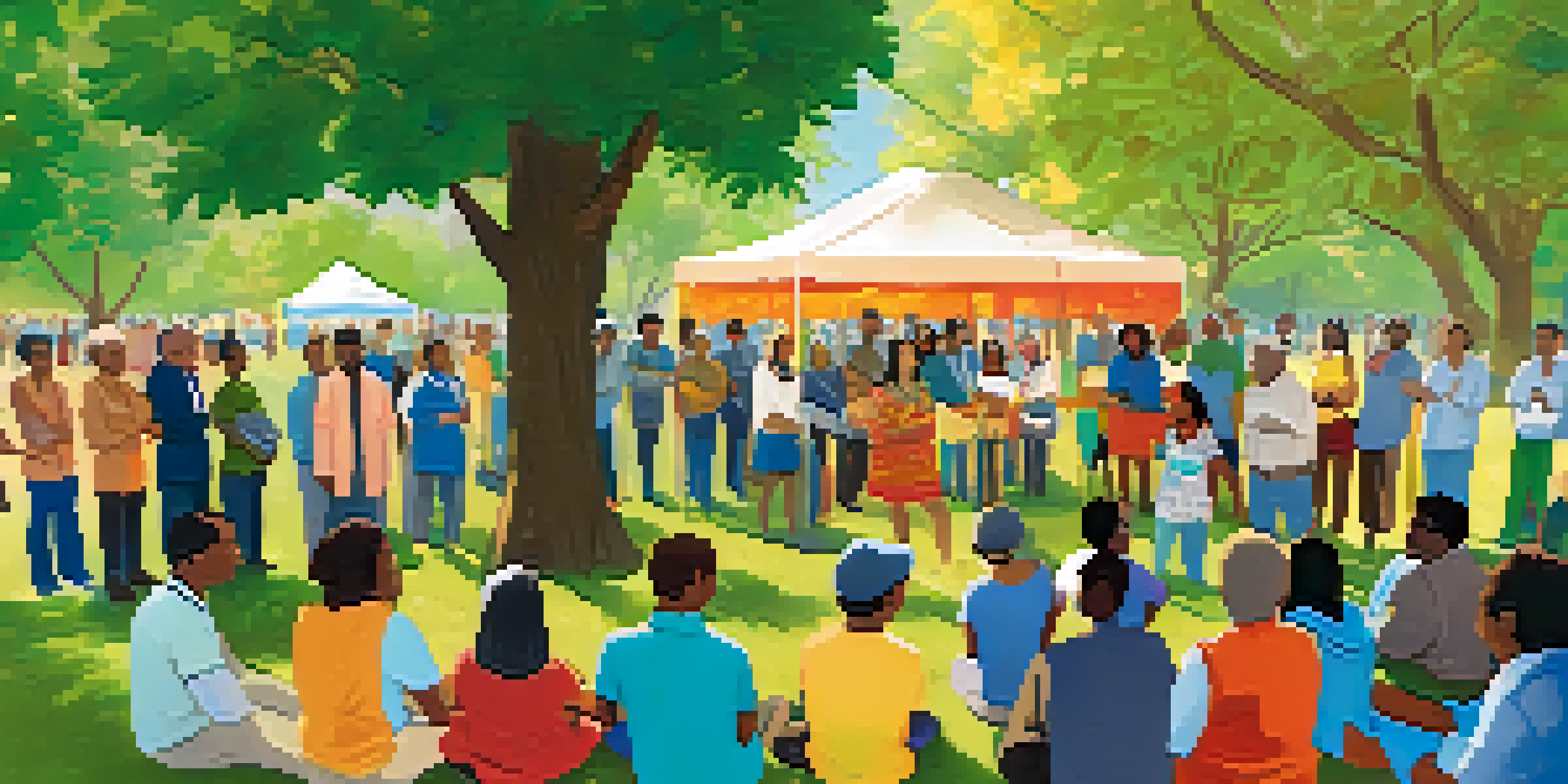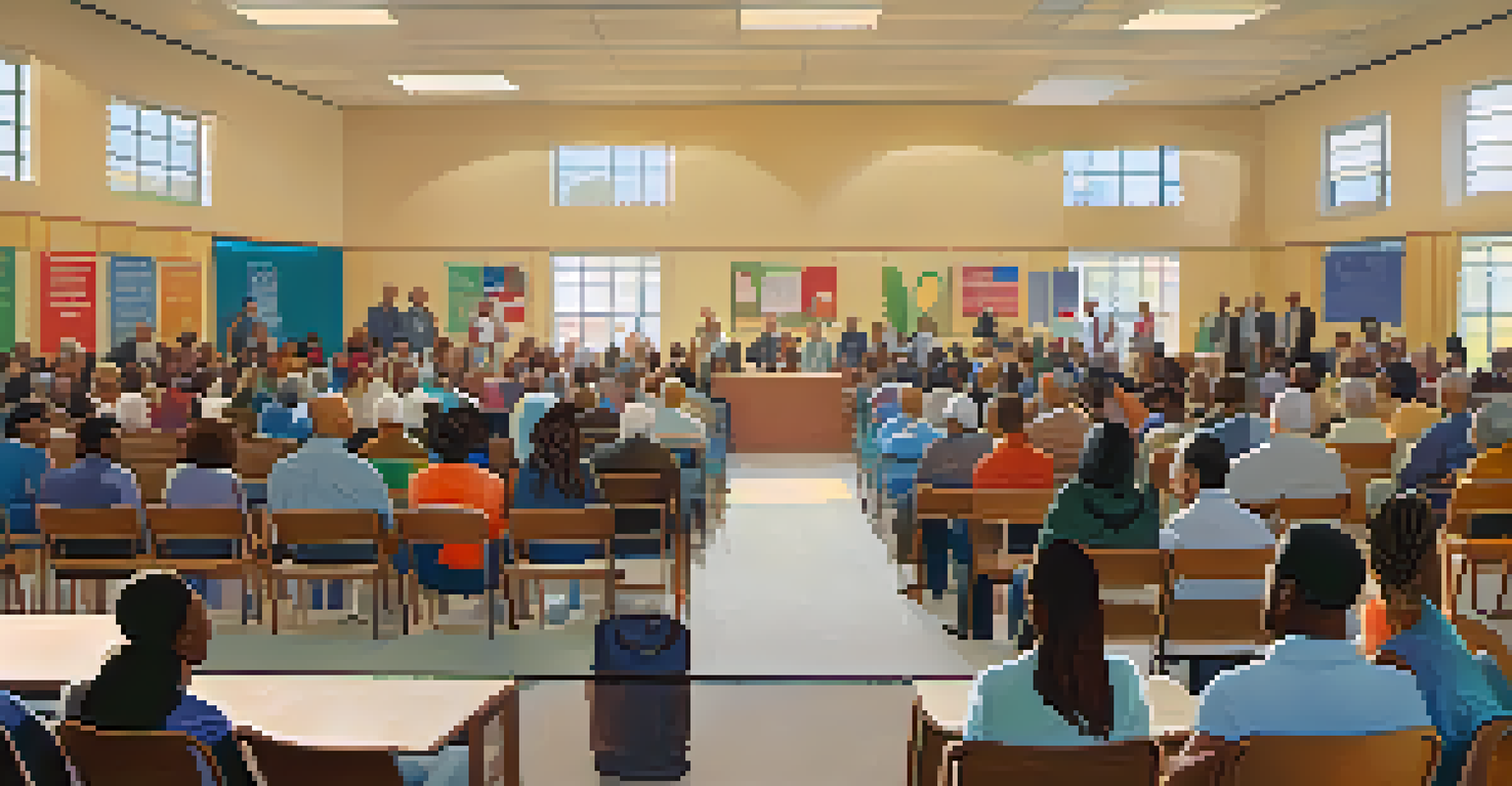The Role of Community Meetings in Civic Engagement Efforts

Understanding Civic Engagement and Its Importance
Civic engagement refers to the ways individuals participate in their community and influence decision-making processes. It's essential because it fosters a sense of responsibility and belonging among citizens. When people engage, they contribute to the health of their democracy, ensuring that diverse voices are heard and represented.
Democracy is not a spectator sport.
Participation can take many forms, from voting and volunteering to attending community meetings. Each of these activities plays a significant role in shaping policies that affect everyday life. For instance, engaging in local discussions can lead to better infrastructure, education systems, and overall community well-being.
In essence, civic engagement is about empowerment. When citizens are informed and involved, they can advocate for their needs and hold leaders accountable, making it a cornerstone of a thriving community.
What Are Community Meetings and Their Purpose?
Community meetings serve as a platform for residents to come together, share ideas, and discuss issues that matter to them. These gatherings can range from town halls to neighborhood forums, providing an avenue for community members to voice their concerns and aspirations. The primary purpose is to promote dialogue and foster collaboration among residents and local leaders.

At these meetings, participants can learn about upcoming projects, voice their opinions, and even collaborate on solutions to local challenges. For example, a community meeting might address a new park development, where residents can discuss features they'd like to see, ensuring the park meets the community's needs.
Civic Engagement Empowers Communities
Civic engagement fosters a sense of responsibility and belonging, allowing citizens to advocate for their needs and hold leaders accountable.
Ultimately, community meetings are about building relationships and trust. They create a space where individuals feel valued and heard, strengthening the social fabric of a neighborhood.
Benefits of Attending Community Meetings
Attending community meetings offers numerous benefits for participants. Firstly, it provides an opportunity to stay informed about local issues and initiatives. This knowledge empowers residents to make decisions and take action that aligns with their values and interests.
The best way to find yourself is to lose yourself in the service of others.
Moreover, these meetings help build connections among neighbors. When people gather to discuss shared concerns, they foster a sense of camaraderie and mutual support. For instance, after attending a meeting focused on neighborhood safety, residents might form a neighborhood watch group to enhance security together.
Additionally, community meetings can lead to tangible changes within the locality. By voicing their opinions and collaborating with local leaders, residents can influence decisions that directly affect their lives, whether it's advocating for better public transportation or improved recreational facilities.
How Community Meetings Foster Inclusivity
One of the critical roles of community meetings is promoting inclusivity within civic engagement. These gatherings encourage participation from diverse groups, ensuring that all voices are represented in the decision-making process. By actively inviting marginalized communities, meetings become a space where everyone's perspective is valued.
For example, a well-organized community meeting might provide translation services for non-English speakers, ensuring that language barriers do not hinder participation. This consideration fosters a more equitable environment where all residents can contribute to discussions.
Community Meetings Build Inclusivity
These gatherings promote diverse participation, ensuring that all voices are represented in the decision-making process.
Inclusivity in community meetings leads to more comprehensive solutions. When diverse perspectives are considered, policies and initiatives are more likely to address the needs of the entire community, rather than just a select few.
The Role of Local Leaders in Community Meetings
Local leaders play a crucial role in the success of community meetings. Their presence not only legitimizes the gathering but also signals to residents that their input is valued. Leaders can facilitate discussions, answer questions, and provide information about ongoing initiatives, thereby enhancing the meeting's effectiveness.
Moreover, when leaders actively listen and respond to community feedback, they build trust and credibility. For instance, if a mayor addresses residents' concerns about traffic safety and commits to implementing changes, it fosters a sense of accountability and encourages continued engagement.
Ultimately, local leaders are the bridge between the community and decision-making bodies. Their involvement can significantly impact how residents perceive their ability to influence change, leading to a more engaged and empowered citizenry.
Challenges Faced by Community Meetings
Despite their benefits, community meetings can face several challenges that hinder effective engagement. One common issue is low attendance, often due to scheduling conflicts or a lack of awareness about the meetings. This can result in an unrepresentative sampling of community voices, limiting the conversation and its outcomes.
Another challenge is ensuring that discussions remain constructive and inclusive. Sometimes, meetings can devolve into heated debates, where some voices dominate the conversation. To combat this, facilitators must establish ground rules that promote respectful dialogue and encourage quieter participants to share their thoughts.
Local Leaders Enhance Meeting Success
The involvement of local leaders legitimizes community meetings, fostering trust and encouraging citizen engagement through active listening.
Moreover, without follow-up actions, community meetings can feel futile. If residents leave without a clear understanding of how their input will be used, it can lead to disillusionment and apathy in future engagements.
Creating Effective Community Meetings
To maximize the impact of community meetings, organizers should prioritize effective planning and execution. This begins with clearly defining the meeting's purpose and agenda, ensuring that all participants know what to expect. For example, if the focus is on discussing a new housing development, providing background information beforehand can lead to more informed discussions.
Additionally, incorporating interactive elements can enhance engagement. Techniques like small group discussions or Q&A sessions allow participants to share their thoughts in a more intimate setting, making it easier for everyone to contribute. This approach can lead to richer discussions and more diverse input.

Finally, follow-up is critical. After the meeting, sharing a summary of the discussions and outlining next steps keeps participants informed and reinforces the value of their contributions, encouraging ongoing civic engagement.